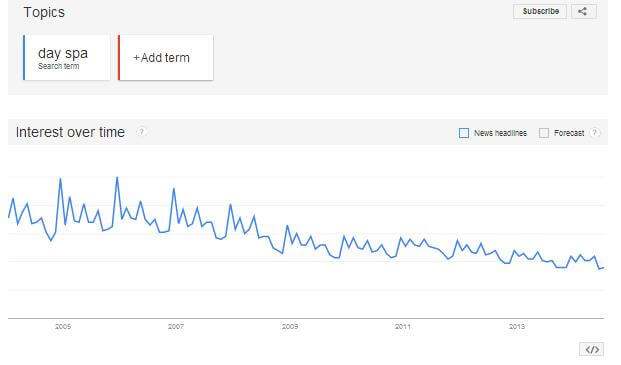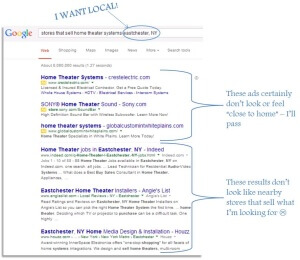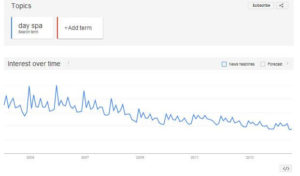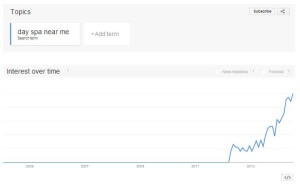Over the course of the past year, I asked 12 prospective clients what they would do if they wanted to find a local business. The overwhelming response from all 12 (as anticipated) was “Google it!”, or something akin.
Beyond my first inquiry, I pressed the issue by asking “What words would you use in that search?”
Eleven of the 12 gave me a response that used the physical location in the search terms: “Cosmetics stores near Medford”, “Wedding bands in Dayton”, “Kids jeans in Longmont, Colorado”, etc. Geo-local is an enormous opportunity to drive relevant, high-intent and ready-to-convert search traffic.
Here’s a quick exercise you can try. Think of a product (or service) – something you’ve needed recently purchased or are considering purchasing. Try to think beyond just “type-of-business” and search for something specific (i.e. if I need tax preparation software, I wouldn’t search for ‘software companies’). Do you need a new landscaper? How about a new home theatre sound system? Now search for that product locally. Are the results exactly what you’re looking for? Here’s what I’m seeing:
This illustration is the epitome of opportunity. If there was a business that was deep enough with their content and emphasized the importance of location, they probably would have earned my click.
We say it all the time, today’s consumer has an extremely high expectation of Google and the other search engines. We paint a picture in our heads of what we want, we ask for it explicitly and we expect to be shown something relevant. That’s the way it works, right?
Marketers need to understand how trends are changing when it comes to local along with the kinds of terms that are losing stock and value. This is some recent data from Google Trends to illustrate. The term ‘day spa’ has shown a decline in volume for years:
Generally, when someone is looking for a spa, they’re looking for something close by. Look at the spike in volume for “day spas near me”:
Local search has put itself on the map over the past two to three years. Consumers are using their phones, tablets and desktops to find what they want instantly, and they’re looking for businesses in their proximity – usually within five miles of their physical location. Optimisation at the local level is essential for businesses of all sizes to maintain relevancy – on and offline.
How important is relevancy at the local level?
Whether you’re heading up a large-scale corporation with thousands of locations nationwide or you’re running a small business with one location, being locally relevant is your lifeline.
• 50% of mobile searches are to find a local business (61% of those result in a purchase within 24 hours) [Search Engine Watch]
• Among mobile searchers, 53% go to the store directly to purchase [DAC/Kantar Consumer Search Behavior Study]
• 74% of internet users perform local queries [LinkedIn]
• Over 100 million people per month use Google Maps on their phone to locate a nearby business
• 43% of total Google searches are local in nature [Search Engine Land]
• Microsoft claims that 53% of Bing searches have local intent
What can you do to strengthen your messaging and influence to help convert high-intent, local buyers?
No matter how large or small your geographical footprint local content will lift conversion rates drive strong, profitable returns. The first step in becoming a friendly neighborhood business is to ensure your local listings and your location data is accurate and pervasive across all major search engines and local search directories. Local listings and directory listings generate a ton of traffic with high purchase intent. For those interested in learning more about this, I encourage you to reach out to our LLM team to give you a deeper dive on location management (LLM).
Once your (local) listings are in order, the second step is to figure out how to amplify the strength of your brand, especially if it’s a national brand, down to the local level. – think, local relevancy. Here are five tactics that work well:
1. Location extensions in paid search (SEM) ads
2. Facebook pages for each individual location
3. City-level targeting for PPC and performance-based campaigns
4. Implement schema markup to tell Google and the other engines where you’re located
5. Optimise specific services and products at the local level and invest in measurement and tracking technologies to determine how its driving leads and sales
The best advice I can give is to never short-change your organization when it comes to local marketing at scale. Simple strategies won’t be sustainable; the return of a complex and pervasive local presence will far exceed the investment over time. Really good local content remains the optimal tool to attract local buyers online.
Local search marketing is something consumers rely on daily. How many times have you been out running an errand and you remember a last-minute item you need (millions?) What do you do? Likely you pull out your smartphone to find where you can find what you need – close by. Businesses that can develop real depth and localisation within their content strategies are going to come away the winners, shaping their brands, establishing trust, building loyalty, edging out the competition and reaping the profits.
Interested in finding out more? Contact DAC today!







